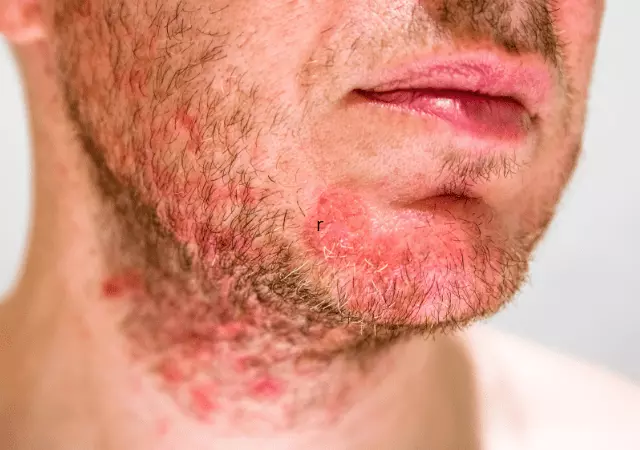Looking for essential oils for perioral dermatitis? You have found the right page.
In this article, you will read about some of the best essential oils for perioral dermatitis that are evidence-based and considered safe to use.
Read: Eucalyptus Oil Benefits for Eczema
Contents
The Best Essential Oils for Perioral Dermatitis

Here are some of the best essential oils:
1. Lavender Essential Oil
Lavender oil has antiseptic, antifungal, and anti-inflammatory properties which make it a perfect choice for perioral dermatitis.
It can soothe the skin, improve the appearance of perioral dermatitis, and reduce redness and inflammation.
A recent study that looked at the effects of lavender and other essential oils on atopic dermatitis revealed that the combined use of lavender essential oil and other oils reduced the symptoms of perioral dermatitis.
2. Tea Tree Essential Oil
Tea tree oil is another great essential oil that can be used to treat perioral dermatitis. It has anti-inflammatory properties that help relieve the symptoms of this condition.
A study that was conducted in 1999 revealed that the use of tea tree essential oil has a strong positive effect on a number of patients with perioral dermatitis.
3. Frankincense Essential Oil
Frankincense oil is one of the best essential oils that you can use to treat this condition. It has antimicrobial and anti-inflammatory properties that help in preventing infection.
Not only this but it also helps to relieve the itching and dryness of the skin which is very common in perioral dermatitis.
Studies reveal that Frankincense oil has anxiolytic, antiseptic, antibacterial, anti-inflammatory, antioxidant, and analgesic effects that combined with its neurotic properties can help with hormonal imbalance and other culprits for perioral dermatitis.
4. Sandalwood Essential Oil
Sandalwood oil is known to be good for treating acne, so it can also be used to treat perioral dermatitis. It helps in healing the skin and reducing inflammation, which makes it a good choice for perioral dermatitis.
According to this study, sandalwood oil can treat psoriasis, common warts, and perioral dermatitis. This is because of the a-santol, the main content in this oil which has anti-microbial and anti-inflammatory effects on the skin.
5. Oregano Essential Oil
Oregano oil is another natural remedy for perioral dermatitis as it contains antibacterial and antifungal properties that help to promote healing and reduce inflammation.
According to this study, oregano oil can improve skin health and its antimicrobial properties help treat many skin conditions.
Side Effects
- Skin irritation
- Eye redness
- Burning
- Nausea
- Vomiting
Precautions!
- Not recommended for pregnant or lactating mothers
- Not suitable for children below 5 years
- Always dilute essential oils before application
How to Use Essential Oils for Perioral Dermatitis?
Here are some of the best ways you can use these essential oils:
1. Massage
This is probably the best and easiest way of using essential oils but do not use them undiluted.
To dilute, mix an equal amount of essential oil with any carrier oil of your choice and massage the affected area.
2. Steaming
Add a few drops of your favorite essential oil in a steamer and steam your face for 5-10 minutes. Make sure your eyes are closed to avoid irritation and other related issues.
2. Bath
Add a few drops of any essential oil of your choice in lukewarm water and wash your face at least twice a day.
The Bottom Line!
The above-mentioned essential oils for perioral dermatitis are some of the best and safest essential oils available.
For most people, they are safe to use, however, some people may experience some side effects. In such a case, stop the use and consult with your doctor if necessary.
The content present on this page has not been evaluated by any medical authorities e.g FDA. All the information present is solely for informational purposes and is not a substitute for the medical advice provided by your physician. We do not aim to diagnose, treat, or cure any disease or illness.

I am a medical student (MD) and a professional blogger. My aim is to help and educate people about essential oils and how they can be beneficial in improving overall health if used in a proper way.
